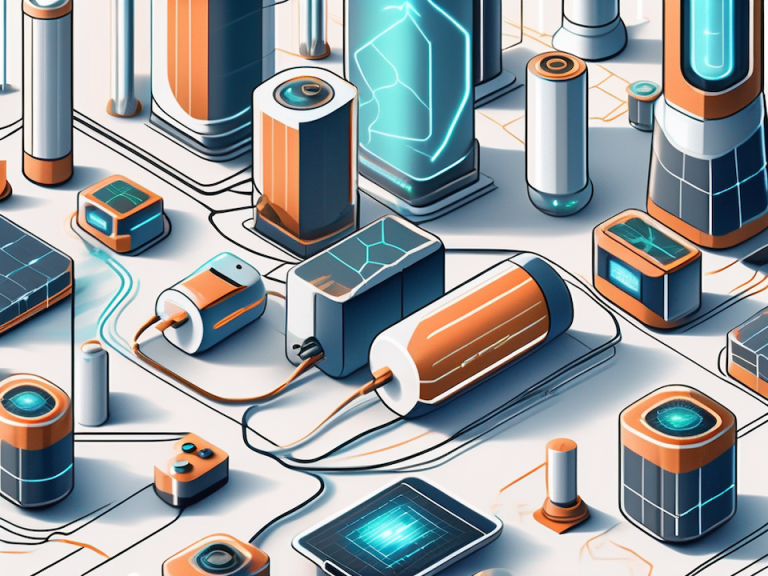Introduction
As smart home technology continues to evolve, lithium-ion batteries have emerged as a crucial component in powering a wide array of devices. From smart speakers and security cameras to thermostats and lighting systems, these batteries enable functionality, convenience, and energy efficiency. This article explores the innovations and trends surrounding lithium-ion batteries in smart home devices, highlighting their impact on the industry and the future of home automation.

The Role of Lithium-Ion Batteries in Smart Homes
Lithium-ion batteries are favored in smart home devices for several compelling reasons:
- High Energy Density
One of the primary advantages of lithium-ion batteries is their high energy density, which allows them to store more energy in a smaller volume compared to traditional batteries. This characteristic is crucial for compact smart devices that require efficient power sources without compromising on size or weight.
- Rechargeability and Longevity
Lithium-ion batteries are rechargeable, offering a significant cost and environmental benefit over disposable batteries. Additionally, they have a long cycle life, meaning they can withstand numerous charge and discharge cycles while maintaining performance. This durability is essential for devices that operate continuously or require frequent use.
- Low Self-Discharge Rate
Lithium-ion batteries exhibit a low self-discharge rate, which means they retain their charge for longer periods when not in use. This feature is particularly beneficial for smart home devices that may not be used daily, ensuring they are ready for operation when needed.
Innovations in Lithium-Ion Battery Technology
The advancements in lithium-ion battery technology are driving innovation in smart home devices. Some notable innovations include:
- Fast Charging Capabilities
Recent developments in battery chemistry and design have led to faster charging technologies, allowing devices to recharge in a fraction of the time it previously took. This innovation enhances user convenience and encourages the use of smart home devices without the frustration of long charging times.
- Battery Management Systems (BMS)
Modern lithium-ion batteries often come equipped with sophisticated Battery Management Systems. These systems monitor battery health, temperature, and charge status, ensuring optimal performance and safety. In smart home devices, BMS technology helps extend battery life and prevent overheating, enhancing overall device reliability.
- Integration with Renewable Energy Sources
As sustainability becomes a priority for consumers, the integration of lithium-ion batteries with renewable energy sources, such as solar panels, is gaining traction. Smart home systems can utilize these batteries to store energy generated during the day for use during peak hours or at night, promoting energy efficiency and reducing electricity costs.
- Advanced Recycling Technologies
With the increasing adoption of lithium-ion batteries comes the need for sustainable recycling solutions. Innovations in recycling technologies are emerging to recover valuable materials from used batteries, reducing environmental impact and promoting a circular economy. These advancements are crucial for addressing the growing concern over battery waste.
Trends Shaping the Future of Lithium-Ion Batteries in Smart Homes
Several trends are influencing the future of lithium-ion batteries in smart home devices:
- Increased Demand for Energy Efficiency
As consumers become more energy-conscious, the demand for energy-efficient smart home devices is rising. Lithium-ion batteries enable devices to operate efficiently, minimizing energy consumption and contributing to overall sustainability goals. Manufacturers are increasingly focusing on developing products that leverage battery technology to enhance energy efficiency.
- Expansion of Smart Home Ecosystems
The proliferation of smart home ecosystems, where devices from different manufacturers work together seamlessly, is driving the demand for reliable power sources. Lithium-ion batteries play a vital role in ensuring that these interconnected devices maintain functionality and communicate effectively.
- Growing Market for Home Automation
The market for home automation continues to expand, with consumers seeking convenient, user-friendly solutions for managing their homes. Lithium-ion batteries support this trend by powering a variety of devices, from smart locks to automated blinds, enhancing the overall smart home experience.
- Focus on Health and Safety
As health-conscious consumers seek smart devices that promote wellness, battery technology is adapting to support this trend. For instance, smart health devices such as fitness trackers and health monitors rely on lithium-ion batteries to deliver consistent performance. Innovations in battery safety, including thermal management systems, are also becoming increasingly important in this context.
Challenges and Considerations
While lithium-ion batteries offer many advantages, there are challenges to consider:
- Battery Degradation
Over time, lithium-ion batteries experience degradation, leading to reduced capacity and performance. This is a natural process, but manufacturers are continually researching ways to extend battery life and enhance durability through advanced materials and design improvements.
- Environmental Impact
The production and disposal of lithium-ion batteries raise environmental concerns, particularly regarding resource extraction and waste management. As the demand for batteries grows, it is essential for manufacturers to prioritize sustainable practices and invest in recycling solutions.
- Cost Considerations
While lithium-ion battery prices have decreased significantly in recent years, they can still represent a substantial portion of the cost of smart home devices. Manufacturers must balance performance, cost, and sustainability to remain competitive in the market.
Conclusion
Lithium-ion batteries are revolutionizing the smart home industry, enabling innovations that enhance energy efficiency, convenience, and safety. With their high energy density, rechargeability, and longevity, these batteries are ideal for powering a wide range of smart devices.
As technology continues to evolve, advancements in lithium-ion battery chemistry, recycling, and integration with renewable energy sources will further enhance their role in smart homes. While challenges remain, the future of lithium-ion batteries in smart home devices is bright, promising a more sustainable and connected way of living.

